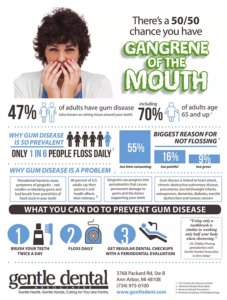50 percent of adults have this mouth disease and may not even know
December 3rd, 2018
About one of every six people say they floss their teeth at least once a day, according to a recent survey conducted in partnership with the American Dental Association (ADA). But that doesn’t mean they’re using dental floss for the job.
More than 60 percent of Americans say they sometimes use their fingernails to get food and gunk out of their teeth. And that’s not the only unsafe and unsanitary tool people admit to using.
Here are 10 more things people use to floss their teeth, according to ADA surveys:
- folder paper or cards
- cutlery
- safety pins
- strands of hair
- twigs
- toenails
- matchbooks
- loose electrical wires
- screwdrivers
- pocket knives
The list makes you wonder if the 8 percent of Americans who never floss with anything are better off! However, lack of flossing is a key contributor to gum and bone disease, or periodontitis, which affects nearly one of every two adults age 30 and up, according to the U.S. Centers for Disease Control.
Not only is gum disease bad for your mouth, but it also is linked to other serious health problems like cancer and heart disease. Yet, many people with periodontitis don’t even know they have it.
“Because the nerve endings in the gum and bone tissue around the teeth are not particularly sensitive, there normally is no pain when those sites present with infection. The problem is thus ignored,” said Dr. Debby Hwang, a periodontist with Gentle Dental Associates in Ann Arbor.
Every adult should have a periodontal exam once a year, and it is even better when that exam is done by a gum specialist known as a periodontist. At Gentle Dental Associates, periodontist Debby Hwang examines each adult patient once a year at no additional cost.
What is gum disease?
Bacteria naturally builds up in your mouth over the course of a day. If not removed, the bacteria cause plaque and, over time, tartar along and under your gum line. Eventually, that plaque and tartar can cause inflammation of your gums. That’s called gingivitis, an early stage of gum disease.
Symptoms of gingivitis include bad breath, caused by bacteria and bits of decaying food stuck in your teeth, and gums that are red, swollen or bleeding. The good news is that gingivitis can be reversed with attention from a dentist or a periodontal specialist.
But it also can progress into periodontitis, which is an advanced stage of gum disease when the damaged tissue pulls away from the teeth and creates gaps or pockets for even more bacteria. Those pockets can cause permanent damage to the bones in your jaw, loosening teeth and even causing them to fall out.
How gum disease leads to bigger problems
In addition to causing jaw bone and tooth damage, people with gum disease have a higher risk of other serious diseases. The bacteria that cause periodontitis can travel through the bloodstream to other parts of the body, or the body may work so hard to fight periodontitis that other organs are exposed to threats.
There’s evidence connecting periodontal inflammation to heart attack, stroke, pre-term/low-birthweight infants, chronic obstructive pulmonary disease, pneumonia, osteoporosis and cancers of the lung, skin, breast, kidney, pancreas and blood.
“Basically, no part of the body is isolated somehow from other parts,” Hwang said. “If there is a problem in one location, then there is potential for a problem in another spot.”
What you can do to prevent periodontitis
Nearly half of Americans have some level of gum disease, and it afflicts more than two-thirds of adults age 65 and older. It’s so prevalent because people often are lax in their daily oral hygiene or they may neglect a regular semi-annual visit to the dentist.
Many people just aren’t aware of periodontitis and how damaging it can be. But you should know that it is preventable. The best way to prevent gum and bone disease is by daily brushing and flossing, along with regular dental checkups.
Brushing and flossing gets rid of bacteria before it can build up, and your dentist can remove plaque in hard to reach places that regular brushing and flossing miss. Still, the vast majority of people do not floss regularly. For example, surveys find that 20 percent of adults say they only floss when something is stuck in their teeth, and nearly half admit they lie to their dentist about how often they floss.
For many people, daily flossing just takes too much time, hurts too much or is too gross. Unfortunately, the alternative could end up being much worse.
“Using only a toothbrush is like washing only half your body when showering,” Hwang said. “It’s best to do a complete cleanse.”
In addition to daily brushing and flossing (with floss, not toothpicks or fingernails), every adult should have a periodontal exam once a year by a gum specialist known as a periodontist. Call to schedule your gum health evaluation.
Just because you may have great-looking, healthy teeth does not necessarily mean that your gums and jaw bones are healthy, since the microorganisms that cause cavities are different than the bacteria that cause gingivitis and periodontitis.



 Website Powered by Sesame 24-7™
Website Powered by Sesame 24-7™